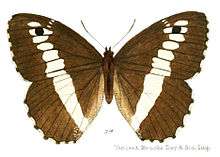Aulocera saraswati
| Striated satyr | |
|---|---|
 | |
| Scientific classification | |
| Kingdom: | Animalia |
| Clade: | Euarthropoda |
| Class: | Insecta |
| Order: | Lepidoptera |
| Family: | Nymphalidae |
| Genus: | Aulocera |
| Species: | A. saraswati |
| Binomial name | |
| Aulocera saraswati Kollar, 1844 | |
Aulocera saraswati, the striated satyr, is a brown (Satyrinae) butterfly that is found in the Himalayas.[1][2]
Range
The butterfly is found in the Himalayas from Chitral eastwards across to Sikkim.[1][3]
Status
In 1932, William Harry Evans reported that the species was common.[3]
Description
The striated satyr is 65 to 75 mm in wingspan.[3]
It is a large powerfully built butterfly which is dark brown above and characterised by a white band across both wings. The white band is broad and straight on the hindwing and reaches the dorsum. The wings have chequered fringes. A dark apical spot or ocellus is present on the forewing. The under hindwing is pale with prominent white striations. The under hindwing is beautifully variegated with brown, white and grey. The tegumen is without hooks.[3][4]
See also
References
- 1 2 "Aulocera Butler, 1867" at Markku Savela's Lepidoptera and Some Other Life Forms
- ↑ LepIndex shows this taxon as Satyrus swaha.[Beccaloni, G.; Scoble, M.; Kitching, I.; Simonsen, T.; Robinson, G.; Pitkin, B.; Hine, A.; Lyal, C., eds. (2003). "Satyrus swaha". The Global Lepidoptera Names Index. Natural History Museum. ] LepIndex considers the genus Aulocera Butler, 1867; Ent. mon. Mag. 4: 121, TS: Satyrus brahminus Blanchard to be a junior subjective synonym of Satyrus Latreille 1810 Cons. gén. Anim. Crust. Arach. Ins.: 355, 440, TS: Papilio actaea Linnaeus.[Beccaloni, G.; Scoble, M.; Kitching, I.; Simonsen, T.; Robinson, G.; Pitkin, B.; Hine, A.; Lyal, C., eds. (2003). "Satyrus". The Global Lepidoptera Names Index. Natural History Museum. ]
- 1 2 3 4 Evans, W.H. (1932). The Identification of Indian Butterflies (2nd ed.). Mumbai, India: Bombay Natural History Society. p. 117, ser no D11.4.
- ↑ Wynter-Blyth, Mark Alexander (1957). Butterflies of the Indian Region. Bombay, India: Bombay Natural History Society. pp. 108–109. ISBN 978-8170192329.